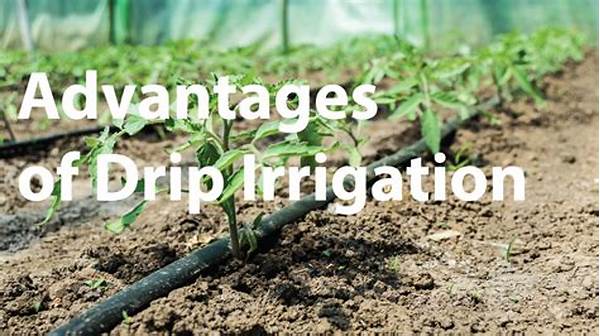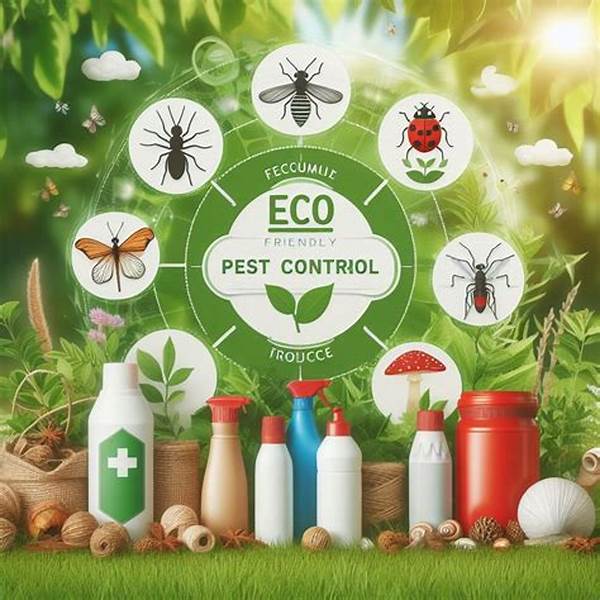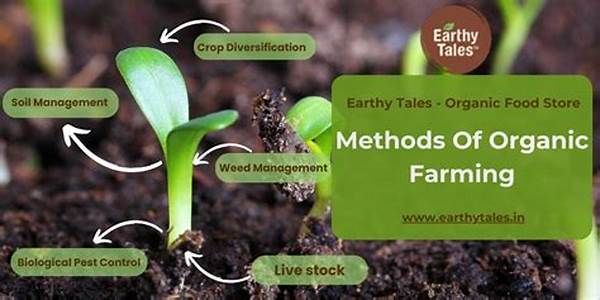In a world where water resources are dwindling and agricultural productivity is more critical than ever, investing in efficient agricultural techniques is not just an option—it’s a necessity. One of the most effective ways to ensure sustainable farming while conserving water is through the adoption of drip irrigation systems. The benefits of drip irrigation systems are manifold, and they extend beyond just water conservation. This article delves into these advantages, making a compelling case for why every farmer should consider this revolutionary agricultural technique.
Read Now : Composting Techniques For Sustainable Farming
Maximizing Water Efficiency with Drip Irrigation
One of the most significant benefits of drip irrigation systems is their unparalleled water efficiency. Unlike traditional irrigation methods, which often result in significant water wastage, drip irrigation delivers water directly to the plant’s root zone. This targeted approach ensures that every drop of water is utilized effectively, minimizing evaporation and runoff. Consequently, this method leads to water savings of up to 70% compared to conventional systems. The precision of drip irrigation not only preserves our precious water resources but also ensures healthier plant growth by maintaining optimal soil moisture levels around the roots. Thus, farmers can achieve higher yields with less water input, making it a win-win solution for agriculture.
Moreover, the benefits of drip irrigation systems extend to labor efficiency. Traditional irrigation systems often require frequent monitoring and manual adjustments. In contrast, drip irrigation systems can be automated, allowing for consistent and precise watering schedules. This automation frees up time for farmers to focus on other important tasks, thereby increasing overall productivity. Additionally, drip systems reduce weed growth by delivering water only where it is needed, limiting unwanted plant competition. Ultimately, adopting a drip irrigation system translates into time savings, cost reductions, and increased crop yields, embodying efficiency in every possible way.
Finally, the environmental benefits of drip irrigation systems cannot be overstated. By significantly reducing water usage, drip irrigation contributes to the sustainable management of natural resources. This method also decreases the risk of soil erosion and nutrient leaching, protecting soil health for future crop cycles. Furthermore, the precision of drip irrigation supports reduced fertilizer usage and promotes the environmentally-friendly application of nutrients. In essence, drip irrigation provides a holistic approach to agriculture, benefiting the environment while supporting sustainable farming practices.
Key Benefits of Drip Irrigation Systems
1. Water Conservation: The primary benefit of drip irrigation systems lies in their ability to dramatically reduce water usage. By delivering water directly to the plant roots, these systems minimize water loss due to evaporation and runoff, offering a sustainable approach to irrigation.
2. Increased Crop Yields: Drip irrigation systems provide consistent moisture to plants, promoting healthier growth and improving crop yields. The precision application of water ensures that crops receive the optimal hydration needed for maximum productivity.
3. Reduced Labor Costs: Automated drip irrigation systems reduce the need for manual watering, cutting labor costs significantly. Farmers can save time and allocate resources more effectively, resulting in improved operational efficiency.
4. Weed Control: By directing water specifically to plant roots, drip irrigation minimizes water availability to weeds, thereby reducing their growth. This targeted water delivery leads to better weed management and healthier crops.
5. Environmental Sustainability: The benefits of drip irrigation systems extend to environmental conservation. They prevent soil erosion, reduce nutrient leaching, and promote eco-friendly farming practices, making them the sustainable choice for modern agriculture.
Economic Advantages of Drip Irrigation Systems
When it comes to agricultural investment, the benefits of drip irrigation systems are notably significant in economic terms. By conserving water and reducing labor costs, drip irrigation offers a substantial return on investment for farmers. Lower water bills and reduced need for manual intervention translate into cost savings that can enhance farm profitability. Over time, the initial setup costs for a drip irrigation system are far outweighed by the financial benefits reaped through increased crop yields and savings on resources. This economic advantage positions drip irrigation as not just an agricultural tool, but as a strategic investment that promises enduring benefits.
Moreover, the precision of drip irrigation systems allows farmers to optimize fertilizer usage. When nutrients are supplied efficiently directly to the root zone, plants can absorb them better, reducing waste and lowering fertilizer costs. This targeted application helps maintain soil health, ensuring long-term fertility and productivity. Consequently, farmers experience further cost savings and achieve optimal crop production. Hence, the economic benefits of drip irrigation systems extend well beyond initial expectations, offering a high return on investment while promoting sustainable agricultural practices.
Read Now : Green Tree Health Supplements
Environmental Impact of Drip Irrigation Systems
The environmental benefits of drip irrigation systems are as compelling as their economic advantages. By limiting water waste and optimizing nutrient delivery, drip irrigation aids in conserving critical natural resources. This conservation contributes to ecosystem resilience, protecting biodiversity and supporting a healthier planet. Drip irrigation also diminishes soil erosion by reducing the force of water application, preserving the land’s integrity and fertility over time. Furthermore, the system’s focus on water efficiency fosters resilience to climate change impacts, safeguarding agricultural productivity in an uncertain future. In adopting drip irrigation systems, farmers are making an environmentally responsible choice that aligns with global sustainability goals.
In addition, drip irrigation’s precise application of water and nutrients helps decrease greenhouse gas emissions associated with excess fertilizer use. By improving nutrient uptake efficiency, these systems minimize the environmental footprint of agricultural operations, promoting a cleaner and greener approach to food production. The drip irrigation system is more than just a solution for efficient water use; it is a step towards a sustainable agricultural future that respects and preserves our planet’s finite resources.
Advanced Technologies in Drip Irrigation Systems
As technology continues to evolve, the benefits of drip irrigation systems are further enhanced by advanced innovations. Today’s systems incorporate smart sensors and IoT capabilities, allowing for real-time monitoring and precise control over water delivery. These cutting-edge technologies enable farmers to make informed decisions quickly, responding to environmental conditions and crop needs with unmatched accuracy. This level of control ensures optimal irrigation management, maximizing resource efficiency and crop performance.
Incorporating technology into drip irrigation systems also provides farmers with valuable data insights. Through advanced monitoring and analytics, farmers can gain a detailed understanding of their irrigation practices and adjust them for peak efficiency. This data-driven approach not only optimizes water and nutrient use but also supports sustainable farming by minimizing environmental impact. As a result, the ongoing integration of technology into drip irrigation systems promises even greater advantages, making them indispensable tools for the future of agriculture.
Future Prospects and Developments in Drip Irrigation Systems
Looking ahead, the potential for innovation in drip irrigation systems holds exciting possibilities. As awareness of water scarcity and the need for sustainable agriculture grows, the adoption of these systems is likely to accelerate. Continued research and development promise new advancements that will further enhance the efficiency and benefits of drip irrigation systems. From solar-powered systems to nanotechnology solutions, the future of drip irrigation is undoubtedly bright, offering cutting-edge answers to the challenges of modern agriculture.
Moreover, as policymakers and environmental organizations recognize the crucial role of efficient irrigation methods in sustainability efforts, support for drip irrigation is likely to increase. Incentives and educational initiatives could spur wider adoption, transforming agricultural landscapes across the globe. As such, the future of drip irrigation systems is intertwined with the global movement toward sustainable development, proving their relevance and necessity in addressing present and future agricultural challenges.
Conclusion: Embracing the Benefits of Drip Irrigation Systems
The time to embrace the benefits of drip irrigation systems is now. As we strive for a future where agriculture is both productive and sustainable, these systems offer invaluable solutions to some of the most pressing challenges in farming. By conserving water, reducing costs, and enhancing yields, drip irrigation paves the way for efficient and sustainable farming practices. Farmers who adopt this innovative method will benefit from improved productivity while contributing to the preservation of our planet’s precious resources.
To ignore the potential of drip irrigation systems is to overlook a key strategy in the pursuit of sustainable agricultural practices. As these systems continue to evolve, their relevance and applicability are only set to grow. For farmers, policymakers, and agricultural advocates alike, understanding and advocating for the benefits of drip irrigation systems is crucial in building a resilient and sustainable agricultural future.



